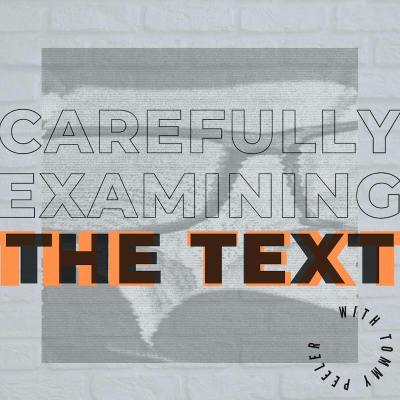
Carefully Examining the Text
inglés
Historia
Disfruta 30 días gratis
4,99 € / mes después de la prueba.Cancela cuando quieras.
- 20 horas de audiolibros / mes
- Podcasts solo en Podimo
- Podcast gratuitos
Acerca de Carefully Examining the Text
To know God and to make Him known through the teaching of the Scriptures
Todos los episodios
180 episodiosJob 5:1-16
5:8-16 The doxology of Eliphaz There are similar doxologies in Job 9:4-12 and 12:13-25. 5:8 But as for me, I would seek God- (Amos 5:4, 6) The Hebrew text actually says but I seek God. Is seeking God in this passage to inquire of the LORD as the word sometimes means in Gen. 25:22; Ex. 18:15; I Kings 14:5; 22:8; II Kings 1:3, 6,16; II Kings 22:18; II Chron. 32:31; Ezek. 14:7; 20:1. 5:9 Who does great and unsearchable things- 9:10; Ps. 136:4. God’s glory is beyond our ability to search or understand (Job 9:10; 11:7; 36:26; Isa. 40:28). Bildad will use the same word for searched in Job 8:8 in which he will say that former generations have searched out this problem of suffering and come to the same conclusions where he and his friends arrived. 5:10 He gives rain on the earth- Ancient people would have attributed the rain to the blessings of their God or gods. Modern man tends to view rain as a natural phenomenon and just as illustration of how the world works. The Bible does not attribute rain to Baal (the contest between Baal and Yahweh in I Kings 17-18). The Bible does not make rain simply a natural law that God built into the world. The Bible speaks of it as a blessing from God’s hand, both in Job 36:27-28; 38:25-26. God sending rain on the just and unjust is a continual illustration of him doing good to those who are His enemies in Matt. 5:45. 5:11 So that He sets on high those who are lowly- The word translated lowly, shakal, is translated humble in Prov. 16:19; 29:23. God often dramatically reverses a person’s situation (I Sam. 2:7-8; Ps. 113:5-8; 147:6; Luke 1:46-56). God exalts the lowly (Matt. 23:12; Luke 14:11; 18:14). 5:12 He frustrates the plotting of the shrewd- God used the counsel of Hushai to thwart (same word translated frustrates here) the good counsel of Ahithophel (II Sam. 17:14).This word shrewd can be used in a positive sense (Prov. 1:4; 8:5; 12:16, 23; 13:16; 14:8, 15, 18; 15:5; 19:25; 22:3; 27:12) or in a negative one (Gen. 3:1; Job 5:12; 15:5). 5:13 He captures the wise by their own shrewdness- The idea is the wise man falling in his own trap he has set for others- Job 18:7-10; 36:8-10; Ps. 7:15; 35:7-8; 57:6; Prov. 26:27; 28:10; Esther 7:10. This verse is quoted by Paul in I Cor. 3:19 and introduced by the wording “For it is written." Does the fact that I Cor. 3:19 shows us that Eliphaz spoke truth demand that he used these words in a proper way? His words are truth, but he seems to place Job among the shrewd who will be brought down. 5:14 By day they meet with darkness- Job 12:24-25; Deut.28:29; Isa. 59:10. And grope at noon as in the night- In the brightest times of the day they will encounter complete darkness (Amos 8:9). 5:15 But He saves from the sword of the mouth- For the tongue as a weapon- Ps. 52:2,4; 64:3; Isa. 54:17; Jer. 18:18; Ps. 12:3-5; 31:21; James 3:5-6. 5:16 So the helpless has hope- 8:13; 11:18; 14:7; Jer. 31:17; Ezek. 37:11; Prov. 19:8; Ruth 1:12; Lam.3:29 The fact that God does these things is a reason for help for the broken. God will catch the world’s expectations by surprise. And unrighteousness must shut its mouth- Ps.107:42. Is Eliphaz placing Job among those who are lowly who will be lifted up or among those who are shrewd who will be brought down? The fact that he emphasizes more about the shrewd who are brought down (vs. 12-14) suggests to me that this is Eliphaz’s emphasis here.
Job 4
4:1-6 Introduction to Eliphaz’ first speech to Job 4:7-11 Eliphaz: We reap what we sow 4:12-16 Eliphaz’ dream vision 4:17-21 The content of the vision What is wrong with what Eliphaz says? The statements of Job 4:7-8 seem to be the basis of the argument of Eliphaz against Job. The idea that we reap what we sow is a fundamental Biblical truth uttered often in Scripture (Hos. 8:7; 10:12; Prov. 11:18; 22:8; Gal. 6:7-9). Matt. 26:52 makes the same point as a general principle Why is Eliphaz stating the same truths as Jesus and inspired writers and yet something seems wrong with his comment? How does these other statements about reaping what we sow differ from his statement in 4:8? How does Psalm 37 fit into this argument? The heading of Psalm 37 mentions it as a psalm of David. Psalm 37:25 says, “I have been young and now I am old, Yet I have not seen the righteous forsaken or his descendants begging bread.” He appeals to his experiences as Eliphaz did. David makes the same kind of observation that Eliphaz does in Job 4:8. Psalm 37:25 asserts the same type of thing that Eliphaz and Job’s other friends argue. Job’s friends believe that his intense suffering must be because he has done something terribly wrong to deserve it. The reader knows on the basis of the prologue of Job that this is not true, and that Job is not suffering because of his sin (Job 1:1, 8; 2:3). How did they misinterpret Scripture and Job’s experience? Passages like Psalm 37 were not given for the purpose of stating that the life of the righteous is always easy and the life of the wicked will always be hard. The intent was to stress that righteousness is the path of blessing and wickedness is the road to disaster. The world of Psalm 37 was a world (like ours) where the wicked often prospered (vss. 1, 7-8, 35) and the righteous were often their main targets of hatred (vss. 12, 14, 32). One sometimes had to choose between being righteous and having little and being wicked and having much (vs. 16). The righteous were sometimes “hurled headlong” (vs. 24) and faced troubles (vs. 39). As already mentioned in the paragraph the righteous experienced the hatred and opposition of the wicked. Yet In spite of appearances of the moment, the Psalm stresses that the wicked would be cut off (vs. 9, 22, 28, 34, 38) and the righteous would inherit the land (vs.9, 11, 22, 29, 34). The prosperity of the wicked though it may be real at the moment was going to be short lived (vs. 1-2, 10, 20, 35-38). The purpose of the writer is to show that the ultimate path to blessing is righteousness, and that wickedness and evil is going to fail regardless of how attractive it will look in the short term. Psalm 37 was not given for the purpose of helping us to distinguish the righteous from the wicked. Psalm 37:25 is not a statement that everyone who finds themselves in financial need is giving clear evidence of their sin. That is not the purpose of Psalm 37. Job’s friends use the same kind of statement as Psalm 37:25 but for the purpose of saying that Job has sinned.
Introduction to the Dialogue of Job
The Bible is God’s message, God’s word (II Timothy 3:16-17; II Peter 1:20-21). However, in the Bible there are speakers that say things that are incorrect or particularly designed to deceive. For example, the words of the serpent, the devil in Gen. 3:4-5; Matt. 4:1-11. The words of false prophets are recorded in I Kings 22:9-12 or Jer. 28:1-4 and false accusations against John and Jesus are recorded in Matt. 11:18-19 and Luke 7:33-34. When the Bible reports something happening it is true but there are those in its pages who do not speak on God’s behalf. Job is the most difficult book of the Bible to determine whether the spokesman is from God or not. In the epilogue the LORD says that Eliphaz and his two friends have not spoken of Him what is right (Job 42:7). The LORD plainly says it, these men do not speak for Him. Does that mean that everything they say is wrong? In Job 5:13 Eliphaz says, “He captures the wise by their shrewdness.” Paul quotes these words in I Cor. 3:19 and introduces them with “For it is written.” The only time that Job is specifically quoted in the New Testament it is the words of Eliphaz. Obviously, not everything that Eliphaz and his friends said was wrong. On the other hand, Job was said to speak of God what was right in Job 42:7. While Job spoke what was right, does that mean that all he spoke was correct? The LORD said that Job, “Who is this who darkens counsel with words without knowledge?” (Job 38:2) and Job repeats these words confessing his sin of speaking of the things “which I did not understand” in 42:3. After this confession, he retracts and repents in 42:6. Clearly, Job says things that are not right. Also, how do we take the words of Elihu? Elihu is not mentioned at all by God at the end of the book. Does that mean that he said nothing different from the friends or does it mean that God approves of his words? The question is how do we know what the various speakers say that is from God and what is not? These factors make Job an extremely difficult book.
Job 3:11-26
3:13 For now I would have lain still and been quiet- When Job lays down he gets no rest (7:4). Job’s point “not that death is so wonderful, but that life has become intolerable. Wilson. Again, the term Sheol is not used in the passage but that is clearly the idea. I would have been asleep then I would have been at rest- Rest is a great blessing of God tied with receiving the land of promise Ex. 33:14; Deut. 3:20; 12:10; 25:19; Josh. 1:13, 15; 21:44; 22:4; 23:1; II Sam. 7:1, 11; I Kings 5:4. This word translated rest will also be used in 3:17, 26. Job believes the same kind of rest associated with the promised land is available in Sheol. Here “Job does not hope that death will rectify the injustice of his undeserved sufferings. It will be enough that it ends them” Anderson, 106. This roll call of Sheol includes the powerful, kings, counsellors of the earth, princes and great men (14-15, 19). It also includes the weak and powerless like infants, stillborn children, the weary, and the slaves, the small (16, 19). This list also has those who are ungodly like the wicked and prisoners (17-18). All together are united in Sheol. Death and Sheol are great equalizers for all kinds of people (Eccl. 9:2-6). Job speaks of Sheol as a place of rest (13, 17), ease (18), and freedom (19). How much of Job’s words here can be trusted? When the LORD speaks, He will ask Job how much does he really know about these things he speaks about with such authority (38:16-18)?" Smick, 891. Job’s view of Sheol is not consistent throughout the book. For example, the words of Job 10:18-22 and 17:13-16 are much gloomier than the picture in 3:11-19. Job uses at least three of the five terms used in 3:4-6 to describe darkness in speaking of Sheol in Job 10:21-22. Other passages of the OT do not portray Sheol or death in the positive terms seen here (Ps. 6:5; 30:9; 88:11-13; 115:17; Isa. 38:18). In Ecclesiastes in particular it is death itself that renders life’s pursuits vanity (Eccl. 2:12-17, 18-23; 9:5, 10) It is probably best to see Job’s positive view of life after death in 3:11-19 not as representing his final word on Sheol, but as a manifestation of his state of mind at that time. Anything looks better to Job than his present condition. 3:21 Who long for death, but it does not come- The word long for is used for longing or waiting on God in Ps. 33:20; Isa. 8:17; 30:18; 64:4 and of God’s longing to be gracious in Isa. 30:18. God longs to be gracious to those who are longing for Him. The longing for God is most common object of such longing in the biblical account. However, here the object of longing is death and that thought appears only here in the Bible. 3:26 I am not at ease, nor am I quiet- The word for at ease was used in 3:18 and is used later in Job 12:6. In 12:6 the destroyers and those who provoke God are at ease but Job has none. The word quiet was used in 3:13. Here Job has no quiet in contrast to what he envisioned for those who are in Sheol- 3:13. I have no rest, for trouble comes- The word for rest was used in 3:13, 17. The point is the same as that made above about the word quiet. While Job has no rest, those who are in Sheol do in 3:13, 17. The word trouble in vs. 26 is the same word translated raging in vs. 17. Interestingly, in vs. 17 the word is said to characterize the wicked. Job raging is not from his wickedness but from his depth of pain.
Job 3:1-10
Job 3 3:1-10 Job curses the day of his birth Job pours out his grief and pain in a bold and dramatic way. It does not seem to be that Job is specifically addressing anyone specifically in Job 3:1-10. The fact there are so many psalms of lament show how common this is for the people of God. Job’s frustrations throughout the book cannot be blamed solely on his friend’s words because he speaks before they speak. One writer described Job 3 as “one of the most depressing chapters in the Bible” (Alden, 71). However, those who are presently experiencing this kind of pain may identify with and find great comfort in these words. Psalm 88 is filled with darkness. It is a psalm of lament that has no ending of praise and hope. The final word of the Hebrew text and most translations of Psalm 88 is the word darkness. I have found that preaching that psalm has led many people to come out and say seriously, “That was encouraging.” Job’s longing to have never been born is similar to the request of Elijah (I Kings 19:4) and Jonah (Jonah 4:3) for the LORD to take their life. They knew life was in God’s hands and they asked him to take their life and they did not take matters into their own hands. There is a difference between Elijah and Jonah, however. Elijah is broken because his ministry as a prophet has been rejected. Jonah is discouraged because the Ninevites have responded to his message and repented and been spared by God. Jonah wanted the LORD to take his life because the wrong people listened and obeyed his preaching. Jeremiah 20:14-18 Jeremiah had the difficult task of speaking for God and giving an unpopular message to a wicked people.[1] There are several similarities between Jer. 20:14-18 and Job 3. Both deals with cursing the day of one’s birth (Job 3:1, 8; Jer. 20:14). They both mention the announcement of a male child (Job 3:3; Jer. 20:15). Blocking the womb is described in both (Job 3:11; Jer. 20:17). Both use the same Hebrew word trouble (Job 3:10; Jer. 20:18). The hyperbole of Jeremiah 20:14-18 is even more stunning than Job 3:1-10. He asks that the LORD bring judgment upon the man who announced the happy news to his father that he had a son. Jeremiah asks that the judgment against him be like the judgment that fell on Sodom and Gomorrah (20:16; Gen. 19:25-26). He curses the man because he did not kill him before his birth (20:17). Clearly, the innocent man who brought the news to Jeremiah’s father of his birth should not have literally taken Jeremiah’s life in the womb. The text is speaking in using the most extreme exaggeration and overemphasis to say that he wishes he was never born. The words of Matt. 26:24 that it would have been better for Judas if he had never been born do not emphasize his stress in life but the horror of his judgment after death. While we would be worried about anyone near us who uttered the words of Job 3:1-10 or Jer. 20:14-18, the text does seem to show that thoughts like these and expressing these thoughts may be part of the life of some of God’s faithful servants. When we feel completely broken, these passages affirm that many who have sought to follow God have felt the same way. These passages may give us guides for words we can use if we face similar circumstances. They neither curse God nor take His name in vain (Ex. 23:7; Lev. 24:10-16). They do not curse their parents (Ex. 20:12; 21:14). They do vent their frustration that they were born at all. While their efforts to write themselves out of history are not logical, they are understandable. Job and Jeremiah give full expression to their desires within certain limits and boundaries that they will not pass.
Elige tu suscripción
Premium
20 horas de audiolibros
Podcasts solo en Podimo
Podcast gratuitos
Cancela cuando quieras
Disfruta 30 días gratis
Después 4,99 € / month
Premium Plus
100 horas de audiolibros
Podcasts solo en Podimo
Podcast gratuitos
Cancela cuando quieras
Disfruta 30 días gratis
Después 9,99 € / month
Disfruta 30 días gratis. 4,99 € / mes después de la prueba. Cancela cuando quieras.

































